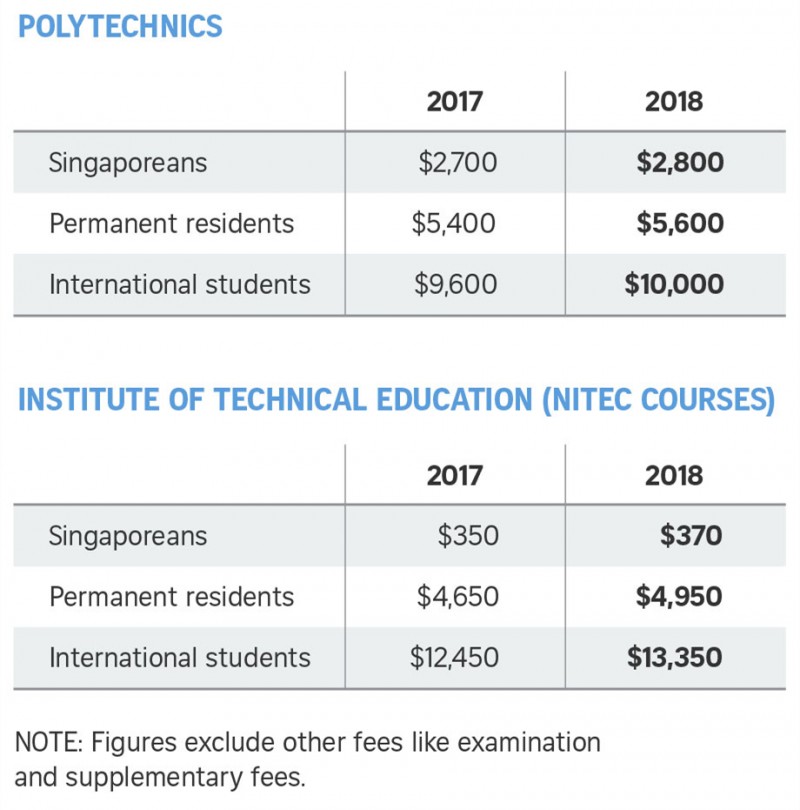Tuition fees for students entering the polytechnics and Institute of Technical Education (ITE) next year (2018) will go up by between 3 per cent and 7 per cent.
The revised fees, which were posted on the schools’ websites on Monday (Dec 11), apply only to newcomers in the 2018 academic year. The polytechnics’ term starts in April, while ITE has two intakes in January and April.
Tuition fees for polytechnics and ITE have been going up yearly in the past few years, and as with previous hikes, the increase will be bigger for permanent residents (PRs) and foreigners compared with citizens.
The Ministry of Education (MOE) told The Straits Times the Government continues to heavily subsidise the cost of polytechnic and ITE education for Singaporeans – at about 85 per cent and more than 90 per cent respectively.
“Tuition fees are reviewed annually and adjusted when necessary to defray the increased cost of quality education, and to allow the polytechnics and ITE to continue to deliver a high-quality education to Singaporeans,” she said, adding: “Where possible, it is preferable to have regular but small fee increases than a significant hike in any one year.”
Singaporeans entering the five polytechnics next year will pay an annual tuition fee of $2,800, up from $2,700 their seniors paid. The polytechnic fees for PRs and international students will go up to $5,600 and $10,000 respectively, up by $200 and $400 from the previous cohorts’ fees.
At the ITE, fees for full-time Nitec courses will go up by $20 for Singaporeans, while PRs and foreign students will pay $300 and $900 more respectively. Fees for the Higher Nitec courses remain unchanged.
The MOE spokesman said students who need help can approach the financial aid offices in the institutions.
“MOE, together with the institutions, will ensure that financial assistance is available to students who need it, and that no deserving student is denied a polytechnic or ITE education due to financial difficulties,” she said.
Financial aid schemes that help students defray their costs of living are also available, she added.
Government bursary amounts were raised this year (2017), with polytechnic and ITE students able to receive up to $2,350 and $1,400 per year respectively, depending on household income.
“The household per capita income cut-off to qualify for the bursaries was also increased from $1,900 to $2,250 per month, which translates to a gross monthly household income of about $9,000 for a family of four,” said the spokesman.
Parents and students The Straits Times contacted said the school fees are still affordable despite the hike, although they hope that more financial help would be made available.
Mr Yong Kian Fatt, 56, whose Secondary 4 son just completed his O levels, said: “It wouldn’t have too much impact on my family… my wife and I are still working. The fees are already heavily subsidised compared to what foreign students pay.
The manager in facility management added: “I believe the Government and self-help groups will provide bursaries, especially for needy families.’’
Madam June Tan, who has a Secondary 4 daughter who might go to polytechnic next year, said: “$100 increase is still manageable… but the price of everything in general keeps going up – textbooks, transport, food – so we have to work harder.”
The 45-year-old, who runs an online clothing business, said she started being a GrabHitch driver this year to earn some extra income.
Secondary 4 student Charlotte Lee, who wants to study marine science and aquaculture at Republic Polytechnic next year, said the fee hike is “rather okay”.
“It’s a small increase, but cumulatively it can be a lot of money,” said the 16-year-old, whose father is self-employed in the engineering industry and mother is a clerk.
“I’d still choose the polytechnic, which is more hands-on, and I think I’ll do better in such a learning environment,” she added.
Article & Picture from Straits Times


